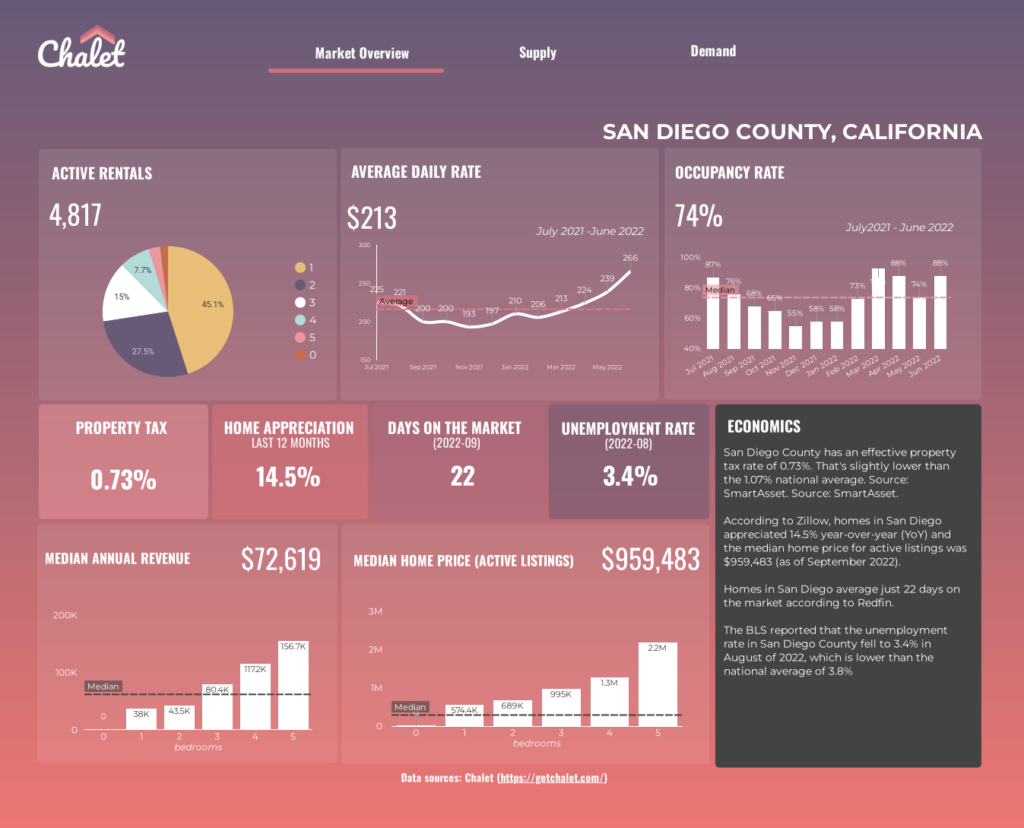Summer 2022 Update
Based on the article in Alive, about 4000 short-term (Airbnb) rentals could soon no longer be allowed to operate in Atlanta because of the new ordinance cracking down on who’s able to rent out their home. Here‘s the link to the new ordinance.
Excerpt from section (d) of the ordinance:
A short-term (Airbnb) rental license may be obtained by a short-term rental owner or the long-term tenant of a
short-term rental for their primary residence and one additional dwelling unit without any additional
requirements, fees, permits, licenses, zoning, or related restrictions.
What this means is that people can own two Airbnb rentals and one of them must be a primary residence. You must be a resident of Atlanta, pay $150 annually for a permit, and pay an 8% tax rental fee.
Airbnb Rentals: FREE Market Reports
Top performing properties, annual revenue, average daily rate, gross yield, occupancy rates, the most popular amenities, and a lot more…
Also, don’t forget to check out Investor Guide to Airbnb Rentals-Atlanta, GA

STR Defined (please note that this is now obsolete)
Fulton County, GA defines a short-term rental property as an accommodation where, in exchange for compensation, a residential dwelling unit is provided for lodging for a period of time not to exceed 30 consecutive days.
- Primary website for Fulton County STR Regulations
Licensing Requirements & Fees (please note that this is now obsolete)
A short-term (Airbnb) rental license must be acquired and issued by the department of city planning to a property owner(s) or the designated agent of short-term rental units.
- A short-term rental license may be obtained by an owner for their primary residence and one additional dwelling unit without any additional requirements, fees, permits, licenses, zoning or related restrictions.
Applicants for a short term rental license must submit an application on an annual basis and cover a non-refundable application fee of $150.
- The application must include the following information:
- The address of the unit to be used as a short term rental.
- The name, address, telephone number, and email of the rental agent who will also act as the 24 hour responsible agent for the short term rental.
- The Airbnb rental agent’s signed acknowledgement that he or she has reviewed the code of ordinances for short-term rentals.
- The number and location of parking spaces allotted to the premises
- An agreement by the owner to use his or her best efforts to assure that use of the premises by occupants will not disrupt the neighborhood, and will not interfere with the rights of neighboring property owners to the quiet enjoyment of their properties
- The applicant must also attach the following to their application:
- Written rules posted in the short term rental unit explaining:
- Acknowledgement that it shall be unlawful to allow or make any noise or sound that exceeds the limits set forth in the city’s noise ordinance. Units are encouraged to provide a noise monitoring device.
- Acknowledgement that the maximum occupancy of a short-term rental unit is limited to two adults per bedroom and, if available, the location and the amount of on-site parking.
- Acknowledgement and agreement that violations of this chapter may result in immediate termination of the agreement and eviction from the short-term rental unit by the owner or agent, as well as the potential liability for payments of fines levied by the city
- Evidence that the short-term rental license applicant has provided notification via certified United States mail to each property adjacent to of their intent to secure a short-term rental license.
- This notification must include the address of the unit to be used as a short-term rental and the name, address, telephone number and email address of the short-term rental agent.
- This notification must be given to each property adjacent to the property at which the applicant is applying to operate a short-term rental.
- This notification shall be sent certified mail to the address of the adjacent property. For purposes of this section, it shall not be necessary for the applicant to identify and include the name of specific owner of record of the adjacent property in this notification.
- If the rental agent changes, the short-term (Airbnb) rental agent shall notify the City of Atlanta within ten business days.
- Written rules posted in the short term rental unit explaining:
Review of an application shall be conducted in accordance with due process principles and shall be granted unless the applicant fails to meet the conditions and requirements of this chapter or federal or state law or local ordinance related to the operation of a short-term rental, or otherwise fails to demonstrate the ability to comply with local, state or federal law through the operation of the proposed short-term (Airbnb) rental.
- Any false statements or information provided in the application are grounds for revocation, suspension and/or imposition of penalties, including denial of future applications.
Hotel License & Business License
- Atlanta currently requires owners and operators of hotels and similar businesses to apply for and receive a license to operate. The license is issued through the Atlanta Police Department’s License and Permit Unit.
- Atlanta also generally requires anyone owning or operating a new business to submit an application and pay an annual tax. For new business owners, the City’s Zoning Enforcement Division will verify if the business can exist in its location.
LLC Ownership Allowed (please note that this is now obsolete)
- Yes, Ordinance No. 2021-14 (20-O-1656) mentions that no person OR entity shall rent, lease, or otherwise exchange for compensation all or any portion of a dwelling unit as short-term rental unit, as defined in Section 20-1003, without first obtaining a short-term (Airbnb) rental license pursuant to the regulations contained in this chapter.
Owning multiple short term rental properties (including within the same property)
- An owner of more than one property can acquire a short term rental license for their primary address and one additional property.
- The owner shall be required to obtain a license for each short term rental property. If the additional short term rental property exists within the same dwelling, each short term rental property, as defined herein, shall be treated as one unit, and a permit shall be required for each unit.
Taxes
- Short-term (Airbnb) rentals are subject to applicable state and local taxes and are responsible for payment thereof as established by state law and the city code. Short-term rentals shall be subject to the hotel-motel tax of eight percent of the charge furnishing short-term rentals as permitted under O.C.G.A. § 48-13-51(a)(5) and O.C.G.A. § 48-13-51(b)(7)(a).
- Current sales tax equals 8.9%, broken down here:
- State sales tax rate of 4%
- Fulton county sales tax of 3.75%
- Atlanta city sales tax of 1.15%
- Current occupancy (room) tax of 7%
- Current sales tax equals 8.9%, broken down here:
- Georgia State Tax Regulations
- Guests who book Airbnb listings that are located in the State of Georgia will pay the following tax as part of their reservation:
- State Sales Tax: 4% of the listing price including any cleaning fees, for reservations 89 nights and shorter. For detailed information, visit the State of Georgia Sales and Use Tax website.
- County/Local Sales Tax: 2% – 5% of the listing price including any cleaning fees, for reservations 89 nights and shorter. For detailed information, visit the State of Georgia Sales and Use Tax website.
- Hotel-Motel Fee: $5 per night, for reservations 30 days and shorter. For detailed information, visit the State of Georgia Taxes website.
- Local Occupancy Taxes: All locally imposed Occupancy Taxes will be collected on reservations in Georgia. The tax varies by city and county. It is typically 0%-6% of the listing price including any cleaning fees for reservations 30 nights and shorter. For detailed information, please visit your local finance department website.
Hosting platforms may have existing agreements with the county or state to collect and pay taxes/fees directly to the county. Hosts located in these areas are responsible for assessing all other tax obligations, including state and city jurisdictions.
Resources:
- : VRBO state and local tax collection and remittance in Georgia
- Airbnb state and local tax collection and remittance in Georgia
Occupancy Limits (please note that this is now obsolete)
- Currently the maximum occupancy of a short-term (Airbnb) rental unit is limited to two adults per bedroom.
Inspections
Building and Housing Standards.
Atlanta has rules and regulations specifying minimum construction, design, and maintenance standards for buildings, including regulations on habitability, health, and safety. Certain regulations are applicable to residential and non-residential uses may be relevant to your listing, including Appendices A to F of the Land Development Code. You can review these here. For more information, contact the Atlanta Office of Code Compliance.
Responsible Agent
- The duties of the short-term rental agent (responsible agent) are to:
- Be available to handle any problems arising from use of the short-term (Airbnb) rental unit
- Keep his or her name and emergency contact phone number posted in a readily visible place in the short-term rental unit
- Receive and accept service of any notice of violation related to the use or occupancy of the /premises
- Monitor the short-term rental unit for compliance with this chapter
- List the short-term rental license number on each online listing
- The short-term (Airbnb) rental agent does not need to be the owner and can be another designated
Zoning
- The city of Atlanta is part of incorporated Fulton County, GA
Browse addresses in Fulton County, GA using this county zoning atlas.
STR Management Considerations
- An ordinance that will amend short-term rental legislation was adopted by the Council on March 15th, 2021 and is set to become effective on March 1, 2022, delayed from the original date of September 1, 2021.
- Owners or long-term tenants of a home will be able to acquire a short-term rental license and designate an “agent” as mentioned above. This agent could be the owner/long-term tenant or another person or an organization.
- Owners can acquire a license for their primary address and one other property.
- No external signage on the short-term rental is allowed under the ordinance, but information about the license and rules of operation must be posted inside. Operators would have to pay the hotel/motel tax.
- A legible copy of the short-term rental unit license shall be posted within the unit and include all of the following information:
- The name, address, telephone number and email address of the short-term rental agent
- The short-term rental unit license number
- The maximum occupancy of the unit
- The maximum number of vehicles that may be parked at the unit
- A legible copy of the short-term rental unit license shall be posted within the unit and include all of the following information:
- It is also important to consider any contracts or rules that may apply outside of county, city, or state regulations.
- Ex: Lease obligations, timeshare rules, HOA rules, etc.
Data Methodology
For this guide, we analyzed everything from public data sources, county assessor records, recently sold homes, data from the Bureau of Labor and Statistics, Airbnb data, and more. Chalet ran this data through machine learning models to derive the forecast models with the most accurate predictions.
Glossary
– ADR: Average Daily Rate
– Gross Yield = Median Revenue/Median Home Price
Thank you for reading. If you are interested in investing in Maricopa County, schedule a free consultation with one of our experts.


